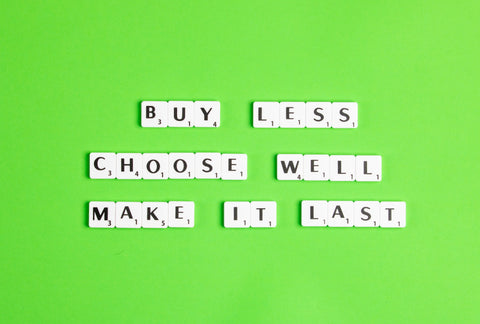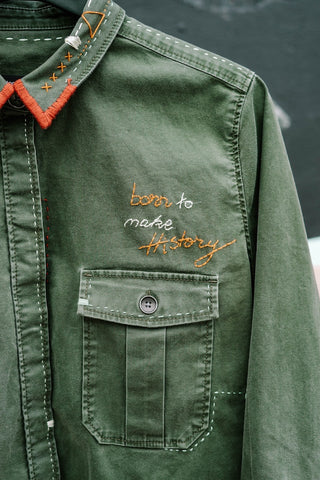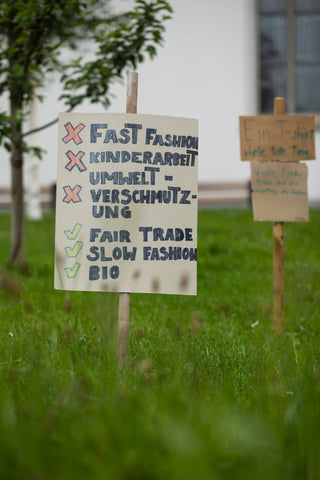The reality is, the most sustainable garment is the one already in your wardrobe.
But, your girl likes to shop! So what do you do when you are caught in the crossfire of sustainability and fashion? You analyze, regroup, and apply the newfound knowledge to your shopping habits.
Fortunately, many consumers are realizing the disastrous environmental impact fashion brands hold and are ready to make some changes. However, these brands are grasping at straws to join in on the movement, using the terminology to appeal to the conscious consumer fully aware of their false claims. For example, H&M is currently being sued for greenwashing (more info on that later).
Whether you are new to the world of sustainable fashion or not, I’m sure you have heard some terminology being thrown around leaving you with more questions than answers. Eco-fashion? Circular? Carbon-Neutral? What do they all mean? Fear not! Below I have compiled a list of 16 terms you should know.
Sustainable Fashion (aka Eco-Fashion)
According to wikipedia “is a term describing product, processes, activities, and actors (policymakers, brands, consumers) aiming to achieve a carbon-neutral fashion industry, built on equality, social justice, animal warfare, and ecological integrity.” However, many say that sustainability and fashion are like oil and water, they simply can not be mixed and therefore that term shouldn’t be used when talking about fashion. But, it will be used by brands and should be taken with a grain of salt.
Ethical Fashion
Not to be confused with Sustainable Fashion. Ethical is usually talking about the social impact of the fashion industry. This covers a wide range of issues such as: living wages, working conditions, health and safety, forced labor, child labor, and fair treatment of animals.
Fast Fashion
Clothing that is produced quickly and inexpensively to fit the latest trends. Goes hand in hand with overproduction, low retail prices, mass waste, poor working conditions, and horrible environmental impact. Think Zara, H&M, Shein, Forever21, GAP, Primark, etc.
Slow/Conscious/Mindful Fashion
The opposite of fast fashion. Refers to buying less and shopping more mindfully. It means buying things when you actually need them and looking for garments of quality, taking into account the impact your purchase has on the environment and the hands who have touched it along the way.

Greenwashing
Aka lying. This is a marketing tactic brands use to appear “sustainable” when they are quite the opposite. We saw this happen with H&M last year and their “Conscious Collection”.
How can you spot it? This article will help you decipher the real from the faux. Link here.
Circular/Closed Loop Fashion
Rethinking and redesign items and their packaging to create safe and/or compostable materials that would help grow more stuff. Focus on a system of create, use, recycle, instead of create, use, trash. Closed loop-very similar-means new clothes are made from preexisting clothes and textiles, once they are done they can be recycled back into yarn/fabric. Not to be confused with resale, secondhand, rental.
Recycling/Upcycling Fashion
Usually used interchangeably but there is a difference. Recycling is converting waste into something new. Upcycling is creatively reimagining an item and transforming it. Upcycling removes waste from the system and requires less energy than recycling.
Parade an awesome underwear & more company that offers a recycling program for one of the most difficult items to recycle: underwear. P.S. As someone who has a hard time finding supportive bralettes (30G!), I have a few of their bralettes and they are *chef’s kiss*.
Check them out here!

Transparency and Traceability
A brand shares information about the manufacturing process, which includes: all factory names, names of workers involved, and even farms where the raw materials are grown. The information behind an item can be traced all the way back the supply chain to its origins. Pretty cool if you ask me.
Vegan Fashion
Means no animal testing or animal derived materials such as: leather, fur, silk, skins. While this may seem like a harmless option, a lot of vegan products are made from plastic which as we know puts a huge strain on the environment. Read the composition tags!
Resale/Secondhand
Finally where we come into action here! The least impactful way to shop, you are extending the life cycle of a garment. Almost a perfect solution but still shop mindfully because you could still be contributing to the never ending cycle of overconsumption.
Cruelty-free
Talking about animal welfare here. This makes sure no animals were harmed during the production but does not mean the item is vegan.
Fair Trade Fashion
Internationally agreed social, environmental, and economic standards. Profits made from products go towards supporting farmers and workers which aims to improve lives and communities.

Living Wage
Does not mean legal minimum wage. It is the bare minimum wage required for workers to live a decent life.
Carbon Neutral/Offsetting/Zero Impact
Aiming to eliminate all carbon emissions from the supply chain. Is it possible? No, not really. Doesn’t mean that the companies making these claims are inherently bad, just that in reality it is a hard promise to complete.
Cost-Per-Wear
Next time you go shopping, think about the cost of the item and how often you will actually wear it. Is it $1 per wear? How about $2. Whatever math you come up with, this method reduces impulse purchases and ensures you will only buy things you truly love.
FSC- Certified
Products made from tree fibers from sustainable sources.
Whew! That was a lot- happy you powered through with me. Did I miss anything? If so, drop a comment in the comments section below.
Till next week,
Dre

